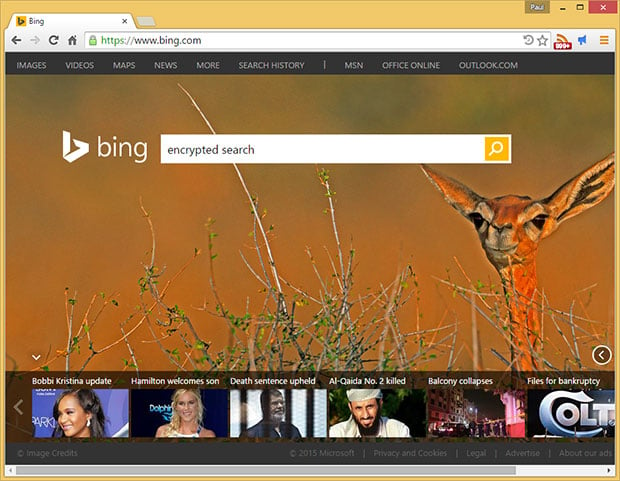Microsoft Brings Default Search Traffic Encryption To Bing
Microsoft this week announced that web searches made using the company's Bing search engine will soon be encrypted by default. In actuality, users have been able to encrypt searches made via Bing for around a year and a half now, though sometime before summer comes to an end, it will be a standard option for all users. The move will level the playing field with Google and Yahoo, both of which already offer encrypted searches by default.
Of course, the bodies at Microsoft still need to eat and so the company will conintue to pass along referrer strings to marketers and webmasters that identify traffic as coming from Bing. What won't be included are the specific search query terms that users input, though Microsoft says it will still provide limited query term data through its various webmaster and advertiser tools. That data won't compromise the security of customer data, Microsoft promises.

"Microsoft has a long-history and deep commitment to helping protect our customers’ data and the security of their systems. While this change may impact marketers and webmasters, we believe that providing a more secure search experience for our users is important," Microsoft stated in a blog post. "With this change, you will still be able to see Bing as the origin (referrer) of the encrypted traffic, though analytics tools you are using to analyze your traffic generally have their own, proprietary way of including this information in their search reports."
Most users won't notice a change. When the switch is made, Bing will add an "S" to "HTTP" in the URL. In the meantime, you can add it yourself to perform an encrypted search.
Microsoft is obviously late to the party here compared to Google and Yahoo, but it's a welcome change at a time when there's so much attention being paid to privacy. This could also help Bing continue to grow its market share. According to data by Net Applications, Microsoft's search engine currently commands nearly 10 percent of the desktop search market, which is almost double what it was a year ago.
Of course, the bodies at Microsoft still need to eat and so the company will conintue to pass along referrer strings to marketers and webmasters that identify traffic as coming from Bing. What won't be included are the specific search query terms that users input, though Microsoft says it will still provide limited query term data through its various webmaster and advertiser tools. That data won't compromise the security of customer data, Microsoft promises.

"Microsoft has a long-history and deep commitment to helping protect our customers’ data and the security of their systems. While this change may impact marketers and webmasters, we believe that providing a more secure search experience for our users is important," Microsoft stated in a blog post. "With this change, you will still be able to see Bing as the origin (referrer) of the encrypted traffic, though analytics tools you are using to analyze your traffic generally have their own, proprietary way of including this information in their search reports."
Most users won't notice a change. When the switch is made, Bing will add an "S" to "HTTP" in the URL. In the meantime, you can add it yourself to perform an encrypted search.
Microsoft is obviously late to the party here compared to Google and Yahoo, but it's a welcome change at a time when there's so much attention being paid to privacy. This could also help Bing continue to grow its market share. According to data by Net Applications, Microsoft's search engine currently commands nearly 10 percent of the desktop search market, which is almost double what it was a year ago.

